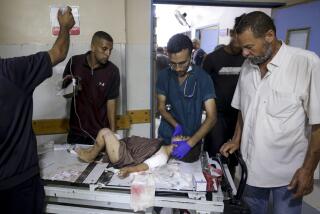U.N. Escorts 800 Troops out of Sarajevo
- Share via
BELGRADE, Yugoslavia — U.N. mediators escorted 800 Yugoslav federal troops out of besieged Sarajevo on Friday, resolving one side of an armed standoff that has prevented food and medicine from reaching the Bosnian capital for weeks.
An indication that the second side of the standoff may be on the point of resolution came later Friday when a tentative agreement was signed to reopen the Sarajevo airport for relief supplies, the Associated Press reported.
Serbian guerrillas attacking the city from surrounding hills had demanded release of the federal soldiers trapped by Bosnian government forces as a condition for lifting their blockade of the airport.
A senior official of the U.N. peacekeeping force in Yugoslavia, civilian affairs coordinator Cedric Thornberry, had conducted lengthy negotiations with Serbian rebel leaders to open the airport for international aid flights. The tentative accord reached late Friday, AP reported, calls for the United Nations to take control of the airport and bring in U.N. personnel to protect it.
The earlier safe-conduct agreement for evacuation of the central Marshal Tito barracks was reached between Bosnian government authorities and senior officers recently mustered out of the Belgrade-led Yugoslav People’s Army who went to the side of Serbian guerrillas fighting against Bosnian independence.
It marked a major breakthrough in the 2-month-old siege that is starving Sarajevo, a multiethnic city of 600,000.
The predominantly Muslim leadership of Bosnia had refused to let the federal soldiers--said by Belgrade to be the last of its troops still in Bosnia--leave the barracks with their tanks, armored personnel carriers and heavy guns.
Belgrade television footage of the evacuation, taken from a Serbian position over the embattled city, showed a 70-vehicle convoy of trucks and buses, suggesting their armor had been left to Bosnian government forces.
Serbian rebels holding Sarajevo airport had refused repeated U.N. appeals to let in crucial food and supplies as long as their federal allies were being held hostage at the barracks.
A deep sense of mistrust between Serbian forces and the Muslim and Croatian troops loyal to the Bosnian government had been intensified by the breach of a similar safe-conduct deal for the Serbs a month ago. Muslim militants, angered by the army’s detention of Bosnian President Alija Izetbegovic, attacked a federal convoy May 3, killing several soldiers.
Although the barracks evacuation held out new hope for easing the Bosnian conflict that has taken 5,700 lives in less than two months, shelling of Sarajevo from Serbian positions was reported to have resumed after the convoy was free of the city center.
More to Read
Sign up for Essential California
The most important California stories and recommendations in your inbox every morning.
You may occasionally receive promotional content from the Los Angeles Times.










